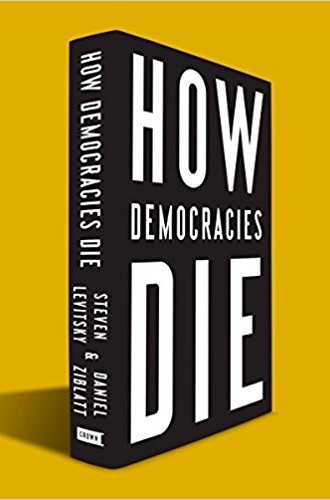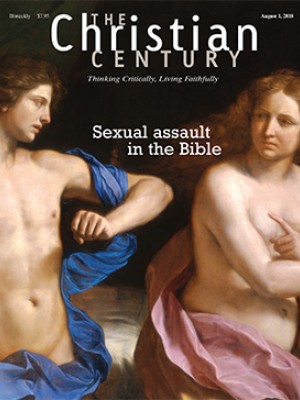When “citizens” turn into “taxpayers,” is there trouble in River City? Noting how commonplace the latter term has become, Marilynne Robinson says yes. When I define myself as a citizen, I have a community—and children and grandchildren—to care about, and I may be pleased to share in the public expense of founding a land-grant college or building a public library. But when I define myself as a taxpayer, the aspirational aspect of community membership weakens. I fix attention on what government is costing me. The generosity and mutual regard that flourish when I savor and am supported by my connection with others lose their purchase on who I am.
Steven Levitsky and Daniel Ziblatt, both professors of government at Harvard, contend that democracy, always and everywhere, is fragile. Having studied democratic breakdown in Latin America and Europe, they know that even when good intentions result in well-developed documents and institutions, authoritarianism can kill democracies. The authors offer not only convincing evidence for their thesis but a summons to vigilance. This summons aims primarily at democracy’s professionals, or what we may call the political class.
Read our latest issue or browse back issues.
But directly or indirectly, the political class gains influence through support from the electorate. Thus, the book engenders questions beyond the focus the authors have settled on. How do you sustain, among voters, the understanding and engagement necessary for empowering truly responsible leaders? How, in other words, do you form a citizenry and not just a rabble of taxpayers?
Levitsky and Ziblatt connect the threat of authoritarianism to unthinking establishment politicians who suppose they can maintain control while collaborating with dubious figures they hope will advance their interests. Collaboration with persons who subvert democratic ideals constitutes a failure of the gatekeeping mission proper to party leaders and to members of the political class in general. Stories involving Adolf Hitler, Benito Mussolini, and Hugo Chavez illustrate this failure.
Appreciation of these stories is now, the authors believe, a matter of urgency. Before binding presidential primaries, party insiders enjoyed greater leverage over the choice of candidates for the American presidency; they could filter out figures such as Charles Lindbergh and Henry Ford who seemed unsuited to democratic leadership. But today, outsiders—especially ones who are wealthy and famous—can defeat the will of insiders.
Levitsky and Ziblatt outline four key indicators of the authoritarian frame of mind: questioning democratic processes, doubting the legitimacy of political opponents, tolerating violence, and supporting curtailment of civil liberties. According to them, Donald Trump “tested positive” on all four of these, and that worried insiders. Yet, as he accelerated toward the Republican nomination, leading party members swung around to endorse him. His rise to the presidency was in substantial part, then, “a story of ineffective gatekeeping.”
Again invoking stories from Latin America and Europe, Levitsky and Ziblatt show that when such persons gain power their impatience usually reveals itself through acts that subvert democracy. Would-be authoritarians threaten the “referees”—the media, the judicial system, and potential opponents—and try to tilt the playing field to their side through gerrymandering, voting restrictions, and changes to the Constitution. When efforts like these coincide with a major social crisis, they can get away with what they are doing. The authors mention Hitler, Vladimir Putin, and Turkey’s Recep Tayyip Erdo˘gan.
Democratic documents and institutions are, by themselves, inadequate protection against authoritarians who try to game the system. The chapter on democracy’s guardrails shows that personal character is crucial. The authors use the example of playground basketball, in which players have the right to call fouls on each other. Players who abuse that right end up ruining the fun. Just as restraint matters in this context, it matters in political life. The two forms of restraint the authors zero in on are “mutual toleration” (treating rivals decently, not as enemies) and “institutional forbearance” (avoiding, for example, schemes like poll taxes and literacy tests). These two norms, they say, are the indispensable guardrails of stable democracy.
In the U.S. one branch of government or another has on occasion defied these norms and weaponized its prerogatives. Under Franklin Roosevelt, the executive branch tried (without succeeding) to stack the Supreme Court by adding judges and appointing loyalists to the new seats. Legislators, especially recently, have indiscriminately blocked appointments to high office by a president from the opposing party. The point here is that even if democracy’s guardrails seem to be holding in America, vigilance must remain a high priority. The requisite norms are fragile.
For Levitsky and Ziblatt, American developments now evoke the metaphor of “unraveling.” The Senate’s 2016 refusal even to consider a president’s (well-qualified) nominee for the Supreme Court was an extraordinary case of norm breaking. But as far back as 1978 Newt Gingrich was speaking of politics as warfare and soon afterward was comparing rivals to Mussolini. During his speakership, which began in 1994, partisan obstructionism, both Republican and Democrat, intensified. By 2008, Fox News was calling Barack Obama Marxist and anti-American; politicians, including Trump, came to the point of denying that he was an American citizen. The “soft guardrails” indispensable to a well-functioning democracy were eroding further. A chapter-length account reflects further on Trump’s contempt for these guardrails and argues that if he has not yet dismantled democratic institutions, he is certainly putting them in danger.
In the final chapter, “Saving Democracy,” Levitsky and Ziblatt predict that polarization will continue and may worsen. But they have enough confidence to call for “a broad prodemocratic coalition” whose members differ politically yet share a passion for mutual toleration and institutional forbearance. Even though the authors have been attending mostly to political professionals, they now make the point that citizens sustain democracy. A democratic society depends ultimately on all of us.
But it seems that in popular discourse, citizens have increasingly become taxpayers, more focused on costs they bear (and often resent) than on challenges and possibilities they share with others. Efforts to save democracy must presuppose success with a more basic task: the making of citizens, people generous enough and capable enough to care deeply about social and political realities. Faithful Protestant communities embrace the legacy of the Hebrew prophets, much as Jesus did, and one function of such communities is the formation of citizens.
A version of this article appears in the print edition under the title “When the guardrails fall apart.”






